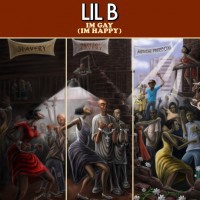Chuck Brown, 1936-2012
“This man, who invented a musical genre and grooved so hard and for so long, is not yet in the Rock ’n’ Roll Hall of Fame. The Dave Clark Five, however, are comfortably settled in the shrine. Argument enough to burn that motherfucker down to the Lake Erie waterline.”
— David Simon reacts strongly to the death of Chuck Brown, the “Godfather of Go-Go,” who died of pneumonia yesterday at the age of 75. An institution in Washington D.C., known best known for live performances that treated funk and partying like spiritual ritual, Brown had his biggest national hit with 1976’s “Bustin’ Loose” — the beat from which would form the basis for St. Louis rapper Nelly’s 2002 smash, “Hot in Herre.” Similarly, 1974’s “Ashley’s Roachclip,” by Brown’s band the Soul Searchers, is more famous for its usage in Eric B. & Rakim’s 1987 “Paid In Full,” and about a million other songs since, than it is in its own right. (The sampled breakbeat starts at the 3:30 mark, and is one of the best beats ever drummed by anyone.) To say that Brown was beloved in his hometown is a vast understatement, as is saying he put on a good show.
Lazy Scientists Don't Know Why Coffee Will Make You Live Forever*
“In this large prospective study, coffee consumption was inversely associated with total and cause-specific mortality. Whether this was a causal or associational finding cannot be determined from our data.” *Not actually “forever” at all. (via)
"'We're the best thing happening in America,' said one tech entrepreneur"

Everybody’s spending his Facebook IPO money before it’s converted to cash! The Bay Area is going to hell in an Hermes handbasket!
Real estate agent Jeff Appenrodt said a client of his recently was among 51 bidders on a three-bedroom, one-bath Edwardian-style home built in 1903 that was showing its age. The client, a tech entrepreneur, made an all-cash offer 50% over the $849,000 asking price — and got thumped. The house sold for $1.4 million to a rival bidder.
Here’s your other damning quote, from a real-estate-broker-to-the-rich: “Everyone feels confident again.” Muh ha ha, you know what that means. (Comeuppance.)
The Cornel West Album That Larry Summers Kept Calling A Rap CD
by Mike Barthel

While we’ve discussed Ian McShane, Corey Feldman and Milla Jovovich, this series on vanity projects has so far not addressed any album responsible for a major cultural scandal, academic controversy or employment change. This time, though, we’re talking about Sketches of My Culture, the first album by legendary academic and all-around super-genius Cornel West. Released in 2001, it became one of the major points of contention in a dispute between West and then-Harvard President Larry Summers that eventually grew so heated West left the university for Princeton. As a concept, the album is appealing: maybe we should make pop music that also educates people about socialist perspectives on race! (It’s worked before, at least the socialist part.) But as a piece of music, Sketches of My Culture raises a few questions to which there aren’t any easy answers. When does the existence of a work matter more than its quality? What do we want from our public intellectuals? And what is wrong with Larry Summers?
THE SONGS: All originals, all spoken-word. Cornel West talking about race, culture and political struggle over instrumentals that take in several centuries’ worth of African-American music and make them sound somehow “lite.” (West doesn’t rap, but uses his normal speaking cadence, which is churchy and already a little musical.) If someone put it on unexpectedly, it would be understandable if you thought they’d switched on some Sunday-afternoon NPR programming.
DID IT SELL? The controversy, which we’ll discuss more below, didn’t help the album move many units.
CURRENT AVAILABILITY: Out of print, and almost entirely disowned: West doesn’t mention it on his website, and in his Wikipedia entry it’s listed under “Dispute with Lawrence Summers,” not “Entertainment career.”
SKETCHINESS OF LABEL: The album was put out by Artemis Records, which, full disclosure, I used to work for, though I was essentially an office flunky when they were pushing West’s album. Former Nirvana manager Danny Goldberg ran the label, and used it to champion various boomer-lefty causes while putting out albums by Warren Zevon and Boston; their major success was in distributing the Baha Men.
MOST HILARIOUS QUOTE FROM AN AMAZON REVIEW OF THE ALBUM: “It brings to mind memories of 1973 ABC made-for-TV movies with the credits all in lower case.”
WHEN HE MADE IT: To talk about Cornel West in 2001 is to talk about Larry Summers, a man who has spent the last two decades being handed high-powered appointments at major institutions and pushing for sweeping changes through the time-tested technique of “acting like a huge jerk.” (One imagines his current topics as a professor at the Kennedy School include “The worst decision-making processes imaginable: A treasury of Larry Summers case studies.”) Summers was appointed president of Harvard in early 2001 and immediately got to work changing things, in this case saying the college needed to be more academically rigorous, which suggests Summers didn’t really understand how Harvard works. And so he brought a bunch of superstar academics into his office and told them to stop grade inflation, do more teaching and produce more scholarship. While academics can all use a kick in the butt from time to time, in West’s case it was more than a little ridiculous, since his book Race Matters had just come out seven years ago and his classes were enormously popular. Even worse, Summers told West that, as a university professor, he was supposed to report to Summers, and that he should make regular progress reports. Summers was evidently not familiar with West’s employment history. Jailed while at Yale for protesting the university’s labor and investment practices, the administration tried to deny him a sabbatical teaching in Paris by requiring him to teach classes in New Haven instead, but West just flew back and forth for the semester’s duration and did both. West had also already changed institutions four times in his career, demonstrating a happiness to relocate campuses when his independence was threatened.
But it was West’s “rap CD” that became the public focus of the debate, which Summers claimed was “an embarrassment” to the university. It’s a great example of Summers’ particular brand of bullying: no matter how ridiculous this was as an objection (I certainly hope my future employers don’t object to the occasional guitar noodling I do in my off-hours), it was a good laugh line, about the only thing that would make Larry Summers seem sympathetic in the public eye. An academic rap CD! LOL! Of course, academics do stuff like this all the time, because a big part of being an academic is trying new things and, if it doesn’t work out, learning from your mistakes. West’s sin was less trying and more getting caught.
At any rate, West was ultimately victorious; he left for Princeton, and after making similarly dunderheaded comments about women in science, Summers was removed as Harvard’s president in 2006. West’s major works since include the memoir Brother West: Living and Loving Out Loud.
WHO MADE IT: West’s brother, Clifton, did most of the music.
THE MUSIC: There was certainly a strong chance that Sketches of my Culture would turn out to be a strong, compelling work (as both his later albums and his collaborations with rappers like Immortal Technique would show). But a whole album of compressed Cornel West is exhausting, and doesn’t serve West’s scholarship well: he’s an important thinker, and like all important thinkers, it’s hard to distill his ideas down into a three-minute snippet. So he confines himself here to stringing together various banal political declarations (“solidarity with Mexican workers, Columbian peasants, Iraqi babies”) or reciting the conclusions from his books without the reasoning behind them. West is obviously a master wordsmith and public speaker, but he’s a prose writer, and a long-form speaker, both of which don’t translate into this pop-song form (all but one track here are five minutes or less in length).
So what about the idea of what he’s doing? There are some neat concepts here: playing snippets from other songs and commenting on them, dialoguing with other thinkers, making musical connections as a way of demonstrating musical history (gospel feeds into jazz, jazz feeds into funk) rather than just the “this thing sounds like that thing” eyebrow-waggle such connections usually indicate. Which is why it’s unfortunate that it doesn’t work. West would get better on his later albums, largely by embracing jazz over pop or rap and letting things play out at the longer length his ideas require. But if the purpose of the album was to bring his ideas to a wider audience, talking with Michael Dyson for twelve minutes over a flute groove is not really going to do that.
He’s not the first to strike out there. Pop lyrics are generally considered to be ineffective as a channel for explicit political messages, and despite lots of tries, very few songs that could double as political statements at either an Occupy or Tea Party rally have broken through to an audience not already interested in such messages. Pop makes its case through aesthetics and charm, not reason, and West’s album was, to most listeners, entirely charm-free.
While the fact that a major African-American scholar born before the hip-hop generation made something categorized as a “rap CD” is noteworthy, Sketches of my Culture is simply not a good album. But that doesn’t mean that mere aesthetics is the only real standard in art, nor that breaking through to a mainstream audience is the only real standard for political art. It just means that Cornel West made a not-particularly-good academic spoken-word album.
Previously: Ian McShane’s From Both Sides Now, Corey Feldman’s Former Child Actor and Milla Jovovich’s Divine Comedy
Mike Barthel has a Tumblr.
Ten Rap Stars Who Have Come Out In Support Of Gay Equality

Our friends at ego trip count Jay-Z’s comments to CNN Monday as the fourth example of a notable rapper to have “publicly voiced some progressive opinion on the issue.” (After Chuck D, El-P and Fat Joe.) But there have been more! 50 Cent, Eminem, Prodigy, ASAP Rocky and Lil B have, too. And N.O.R.E, who last year told XXL magazine, “If a gay person bothers you, that’s because they know something about you that you don’t know about yourself yet… Nobody should really care what happens in someone else’s bedroom… That’s their lifestyle. It doesn’t bother me. I live my lifestyle my way. It doesn’t bother me.”
Another String On Robert Fripp's Guitar Of Life
So David Byrne’s birthday was Monday. Brian Eno’s birthday was yesterday. Today is the 66th birthday of guitar genius Robert Fripp. If anything were going to make me believe in astrology, the fact that these three were all born on roughly the same day might just — nah, even that’s not gonna do it, astrology is junk. Still… WEIRD.
Chefs Are The New Rock Stars And I'm Already Sort Of Wishing They Weren't
“[That] anti-establishment, sticking-it-to-the-man mentality. They’re the ones saying, ‘I’m going to butcher a whole pig and serve you its face, and if you don’t like it, too bad.’”
— Lollapalooza culinary director Graham Elliot, on how celebrity chefs are the new rock stars. You know, for the most part, I am okay with the cultural ascendance of food in America. I like food and I like it to be good, and if silly fetishization and despicable words like “foodie” are the price to pay for an increase in the quality and availability of things for me to eat, fine. But this is all starting to feel like a Dan Cortese “Rock N’ Jock” softball game. (I will pay Darryl Hall A MILLION DOLLARS if he changes the words of “Maneater” to “She’s a ham eater,” after April Bloomfield is done butchering her 200-pound pig on the main stage at The Great GoogaMooga festival on Saturday in Prospect Park.)
